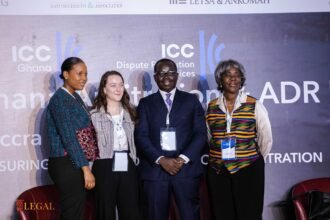
Published March 21, 2025
Introduction
Dr. Justice Srem-Sai stands at a threshold of a significant chapter in his career— a transition into public service as Deputy Attorney-General. This role is not just a position of prestige but a call to national duty, demanding legal acumen integrity and untiring devotion to justice.
With an impressive academic pedigree and years of legal practice, including groundbreaking cases that have shaped Ghana’s jurisprudence, Dr. Srem-Sai is well equipped to take on this responsibility. His nomination by the President is not only a personal achievement but also an inspiration to young lawyers and law students who aspire to excellence in the legal profession.
As a scholar, advocate and mentor, he has demonstrated a deep understanding of the law, and his transition from private practice/academia to public office presents both opportunities and challenges. This article explores his journey, legal philosophy and what his appointment means for Ghana’s legal system
Education:
The trajectory of his academic pursuit and achievements has been remarkable. He obtained his Bachelor of Laws (LLB) from the University of Ghana, Legon, in 2009 and the Qualifying Certificate to practice law (Q.C.L) from the Ghana School of Law in 2011.
He proceeded to obtain two Master of Law (LLM) degrees from the Cardiff University School of Law and Politics, and Harvard Law School. While at Harvard, he earned a place in the highly selective Concentration Program—an opportunity granted to only ten students each year—where he specialized in Corporate Law, Governance, and Public Finance. To cap it all, was the award of a PhD in Human Rights, from the University of Leeds, in the UK, in 2021.
Childhood:
The famous English writer, Graham Greene, once wrote that “There is always one moment in childhood when the door opens and lets the future in”.
Born to the late Emmanuel Srem-Sai, a police officer, and Mary Srem, a trader, Dr. Justice Srem-Sai had always known that he would eventually pursue law, but after completing national service with UBA Bank, he briefly considered a career in banking—believing it was a means to make some money. However, his father’s firm insistence that he pursued law immediately after national service set him on the path to law. In retrospect, he acknowledges that that moment was as pivotal as it was a blessing; for it was the perfect time for him to study law, for which he remains grateful.
Mentor: There is one person who influenced Dr Srem-Sai’s career in a decisive way. That person is Prof. Raymond Atuguba, the current Dean of the University of Ghana School of Law, who identified the talent and potential in Srem-Sai right in his first year in the then Faculty of Law at the University of Ghana. In his words – “it was Prof Atuguba who held my hand through every step of my career; he still holds my hand.”
Notable case at bar:
For many years, Dr. Justice Srem-Sai has been associated with groundbreaking decisions from Ghana’s Superior Courts, that have in no small way enriched our jurisprudence. Without necessarily ranking them in any order, here is a look at some of the decisions:

Dr. Nduom & 2 Others v the Bank of Ghana & 2 Others:
In the case of Dr. Nduom & 2 Others v the Bank of Ghana & 2 Others, Srem-Sai had inter alia argued successfully to have the Supreme Court reverse the position that a person who is aggrieved by the revocation of a banking licence has to submit to arbitration.
The suit had its antecedents in the Banks & Specialized Deposit-Taking Institutions Act of 2016 (Act 930), which provides for arbitration as the means of redress for a person who is aggrieved by the revocation of a banking license. However, the Applicants, through their Counsel, Dr. Srem-Sai, took a different position, namely, that the provision for arbitration in Act 930 does not preclude an aggrieved person from seeking a remedy under Article 33 of the 1992 Constitution.
In agreeing with Dr. Srem-Sai, the Supreme Court held, among other things, that Section 141 of Act 940 does not oust the human rights jurisdiction of the High Court, as the Section contains no ouster element.
The Court emphasized that the Constitution confers jurisdiction on the High Court for redress of human rights violations, which cannot be diminished by an Act of Parliament.
The Supreme Court also rejected the argument that Section 141 of Act 930 defers jurisdiction of the regular courts until arbitration is pursued. According to the Supreme Court, the Applicants had alternative means of redress, including proceeding under Article 33 of the 1992 Constitution
The Republic v Edmund Addo:
Most people must have wondered, “Why the Edmund Addo case?” Dr. Srem-Sai explained that he had identified significant gaps in the prosecution’s case in the case of Edmund Addo.
According to him, the evidence was insufficient to convict the accused person who was put on trial for allegedly publishing the complainant’s explicit content on the internet. Dr Srem-Sai indicated that the investigators and the prosecution had failed to follow laid down procedures, beginning with a wrongful search during the arrest. According to him, the trial reveals overwhelming instances of evidence tampering. This may be found from the forensic examination report on the electronic devices involved – a mobile phone, a laptop, an internet modem and some hard drives.
Dr Srem-Sai criticized the manner in which the case was prosecuted – the case was withdrawn and re-started three different times within a period of 4 years. The current round of trial started in about 2021, and the prosecution only closed its case two years later. Dr Srem-Sai believes that this alone, beside the instances of evidence tampering constitute a violation of the accused’s right to fair trial.
Asked why he would take up such a controversial case, Dr. Srem-Sai maintained that everyone is entitled to a fair trial, regardless of the nature of the alleged crime; and that the role of a criminal defense attorney is to ensure that due process is rigorously upheld in every case.
When asked why he often takes on controversial cases, he explained that such cases come to him naturally. He cited the Edmund Addo case as an example, noting that the accused had found him through a simple Google search for criminal defense attorneys in Ghana.
He further observed that sometimes the controversy arises not from the case itself but from the arguments he presents. While acknowledging that not every lawyer is suited for handling controversial cases, he firmly maintained that a lawyer should not avoid a case simply because of their nature, insisting that “everyone deserves a defense.”
Lessons from handling complex or high-profile cases
Dr. Srem-Sai views high-profile cases as intellectually rewarding, he explains that exploring new areas of law is both challenging and exciting. He believes that many novel legal principles emerged from difficult or controversial cases—much like Marbury v. Madison, where determined lawyers did the extraordinary to establish groundbreaking precedents. He said, “you cannot do ordinary things all the time and expect extraordinary results.”
He acknowledged that you make enemies in handling such cases, noting that prosecution teams, complainants, the public, and even colleagues can become hostile depending on the case. Nonetheless, he accepted these challenges as an inherent part of pursuing justice.
Challenges he expects in his transition to public service
He always knew that a career in public service would come, and come with its own set of challenges. In private practice, he had relished the autonomy of managing his own clients, choosing his personnel, and selecting the cases he took on. However, he observed that within the Attorney-General’s office, such control is absent. Public service, he explained, comes with logistical constraints and layers of bureaucracy. He anticipated that adapting to this more restrictive environment would be a personal challenge, one that would require a significant shift in mindset.

Plan for social media followers, especially those who rely on his simplification of trending complex legal issues
As a public official, Dr. Srem-Sai understands that he must exercise caution and some level of circumspection on social media because personal opinions can easily be conflated with his official role. He noted that most of his posts will align with his responsibilities, yet he remains committed to simplifying legal issues for the public. However, he intends to be selective and steer clear of commenting personally on controversial matters.
Personal Life and Interests
Life beyond law: It is said that, all work and no play, makes ‘Justice’ a dull boy! So Dr. Justice Srem-Sai has some hobbies and interests beyond his professional environment.
He enjoys exercising; however, his busy schedule means he can only exercise as much as possible. He also takes pleasure in night drives, away from the city’s noise, which he finds exhilarating.
Alternate career path
According to Justice, he’d likely have been an artist or photographer. “I love drawing, and I am good at it,” he said, with a grin!
Literature and Philosophy
Favorite book
“Ivanhoe” by Sir Walter Scott, a recommendation from his father that he had read several times.
Favorite quote and philosophy
“Good, better, best; may I never rest until my good is better, and my better best.” To him, it is more than just a rhyme—it is a guiding philosophy. He believes it is a reminder to always strive for excellence and to be among the best in whatever you do. He shared that his father instilled the meaning of this rhyme in him from an early age, shaping his drive for continuous improvement.
Advice to law students
His advice to law students is simple – “read; just read!”. Justice emphasizes the importance of self-study and developing analytical and critical thinking skills. He believes that law students should take responsibility for their learning by reading and understanding the material on their own.
He emphasized that the structure of law courses is designed to help students develop the skills needed to think critically and apply the law in real-life situations. However, he expressed concern about the excessive reliance on extra classes by law students, explaining that it undermines this process. According to him, extra classes allow someone else to do the hard work of understanding and explaining, which leads to memorization without true comprehension. `
To young lawyers, he advised them to remember that merit still counts, and that merit is worth pursuing. As the founder and former head of Praetorium Solicitors, an East-Legon law firm, he prioritizes competence and believes most corporate leaders do the same.
Core Values
Hard work, fortitude and Integrity.
What is Justice proud of?
When asked what he was most proud of in his career, he immediately attributed his pride to his students and mentees. He explained how fulfilling it is to see his former students and mentees succeed in their careers and noted that their progress truly gratifies him. He added that witnessing the growth of his mentees including Abigail Kpabitey (the writer of this piece) fills him with happiness and pride.


Role and Vision as Deputy Attorney General
- Main priorities
In his role as Deputy, Dr. Srem-Sai explained that his primary duty would be to support the vision and goals of the substantive Attorney-General. He stated that one of the best parts of his job would be working with a leader who is genuinely approachable and receptive to new ideas and suggestions. He further noted that his boss regularly consults him on key matters and values his input, creating a collaborative and enriching work environment.
- Reflections on working with former Professor
Dr. Srem-Sai expressed his enthusiasm for the opportunity to work with his former professor, describing him as a fine lecturer who had inspired them all. He stated that despite now being colleagues, he would still view their relationship as one of lecturer and student, as there would always be more to learn.
He highlighted his former professor’s extensive experience in politics, leadership, academia, and management, along with his background as a former Deputy Attorney-General, which, he noted, would give him a deep understanding of the Department’s inner workings. He added that his professor’s humility and exceptional teaching skills would continue to motivate him.
When asked if he admired Hon. Dr Dominic Ayine, he responded with a warm smile, saying that he did and that he has been an inspiration to him from Legon Faculty days. He further stated that, given his existing working relationship with the Attorney-General, his new role would feel like a natural extension of that relationship, albeit in a different capacity.
Ethics and Legal Philosophy
Definition and evolution of “Justice”
Dr. Srem-Sai explained that his understanding of justice evolved over time. In his youth, he equated justice with strict adherence to laws, but experience taught him that what is legal is not always just. “We need to aim for justice, not just legality,” he observed. When asked how he reconciles his views on justice with his current role, he acknowledged the challenge.
The Attorney-General’s department must uphold the existing law, and while he acknowledges he may feel conflicted, “you cannot substitute your personal views for the objective position of the law.”
We can only wish Dr. Justice Srem-Sai well in his position. May he succeed!.
Abigail Kpabitey is a Part 2, Student of the Ghana School of Law, Makola main Campus contributed to this article. Abigail is an avid reader. She has interest in literature and occasionally indulges in Yoga.











